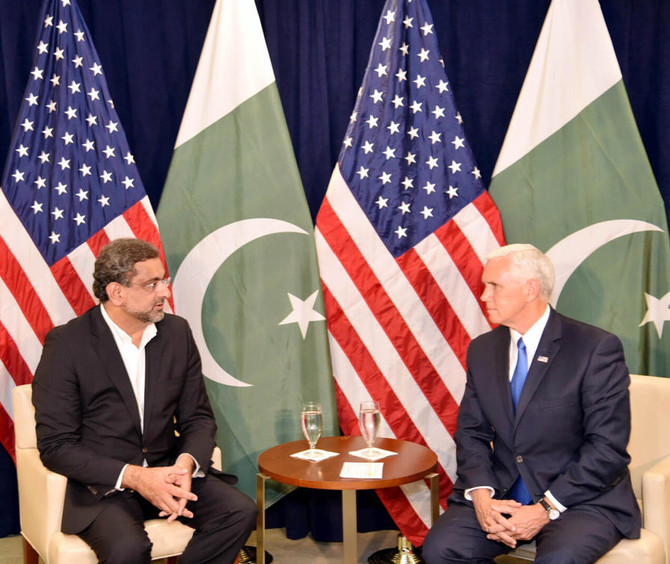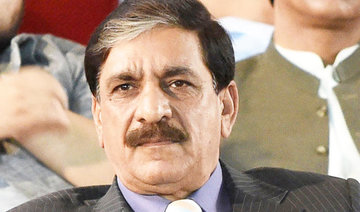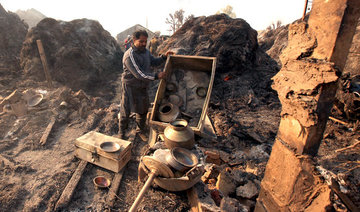ISLAMABAD: US Vice President Mike Pence wants Pakistan to work more closely with Washington to defeat terrorism on its soil.
A White House statement said Pence reiterated President Donald Trump’s “request that the Government of Pakistan must do more to address the continued presence of the Taliban, Haqqani Network, and other terrorist groups operating in their country.”
But the statement did not share any details about the nature of talks and meetings.
PM Shahid Khaqan Abbasi, who is on a private visit to the US, met Pence on Saturday. But his office has not shared anything, so far, with the media about his visit or the meeting.
On Thursday Pakistan’s Foreign Ministry spokesman Mohammad Faisal said that active negotiations are in progress between Pakistan and the US. “It is a difficult balancing act and both sides have conveyed their reservations and differences on the new US strategy to each other.”We are actively seeking to find common ground, as is manifested in continued engagement at all levels between Pakistan and the US.”
Former Foreign Secretary Salman Bashir believes that this particular White House statement reflects a partial view.
“Pakistan and US interests converge on both peace in Afghanistan and countering terror. Both sides need to talk more and cooperate more. There have been positive developments in this regard,” he told Arab News.
Dr. Zafar Nawaz Jaspal, professor of politics and international relations at Quaid-i-Azam University, believes this reflects the significance of Pakistan’s role in the US strategy for culmination of the war in Afghanistan. “Mike Pence asked Prime Minister Abbasi to do more. Doing more means more cooperation.”
Qamar Cheema, a political analyst, told Arab News that the mistrust between Pakistan and the US is over the alleged presence of the Haqqani Network.
“The US has been asking Pakistan to do more on the Haqqani Network, whereas it also accepts that Pakistan has taken certain measures which are appreciable. If the trust deficit between both countries will be bridged, that will be a win-win situation for both,” Cheema said.
Pakistan’s Foreign Secretary Tehmina Janjua visited Washington on March 7-8, where she met senior US officials including US Deputy Secretary of State John Sullivan at the State Department and Deputy National Security Adviser Dr. Nadia Schadlow, at the White House.
According to the Foreign Ministry, Janjua had in-depth discussions with South Asia experts at the US Institute of Peace.
“She reaffirmed Pakistan’s constructive approach to work together with the US for regional peace and stability,” the Foreign Ministry said in a statement after Janjua’s visit.
The US and Afghanistan have been asking Pakistan to move against the Haqqani Network, which the US says operates from Pakistan. However, Islamabad maintains that Pakistani forces have eliminated the infrastructure of militants and acted indiscriminately against all terrorist groups, including the Haqqani Network.
US tells Pakistan: Do more to wipe out terrorism
US tells Pakistan: Do more to wipe out terrorism

Far right tops Romania’s presidential rerun, to face pro-EU candidate in run-off

- Nationalist AUR party leader Simion — a fan of US President Donald Trump — was leading with 40.5 percent of the vote
- He will face off against pro-EU Bucharest mayor Nicusor Dan in the May 18 run-off, who surged to second place at 20.9 percent
BUCHAREST: Romania’s far-right candidate George Simion took a comfortable lead in Sunday’s first round of presidential elections, near-final results for the rerun of last year’s annulled ballot showed.
The closely watched rerun could potentially herald a foreign policy shift in the EU country of 19 million, which has become a key pillar of NATO since Russia’s invasion of Ukraine.
With 99 percent of ballots counted, nationalist AUR party leader Simion — a fan of US President Donald Trump — was leading with 40.5 percent of the vote.
He will face off against pro-EU Bucharest mayor Nicusor Dan in the May 18 run-off, who surged to second place at 20.9 percent, narrowly booting out governing coalition candidate Crin Antonescu at 20.3.
“Together we made history today,” said Simion in a video message broadcast at his party’s headquarters as euphoric supporters chanted “Out with the thieves, let patriots come.”
Political science professor Sergiu Miscoiu told AFP that Simion now faced the uphill task of converting his lead into a win in the run-off, predicting that it would be a close race.
Other experts however have pointed to divisions within the pro-EU camp after a campaign marked by virulent accusations and dirty tricks.
In all, 11 presidential hopefuls were vying for the post which, while largely ceremonial carries some influence in foreign policy.
The rerun follows the cancelation of last year’s vote won by NATO critic Calin Georgescu.
He was barred from the rerun vote after authorities noted a massive TikTok campaign and issued claims of Russian interference, sparking sometimes violent protests.
Georgescu was replaced by 38-year-old Simion, who often dons a cap with the US president’s slogan “Make America Great Again.” He said he hoped to become Romania’s “MAGA president.”
“It’s time to take our country back,” said the barred Georgescu after casting his ballot alongside Simion in Mogosoaia, on the outskirts of Bucharest.
“We are here with a single mission: to return to democracy — and bring justice to Romania,” said Simion, who campaigned on a promise to put Romania first.
Many voters clearly wanted change on Sunday. Robert Teodoroiu told AFP he hoped that this time his ballot would count after last year’s vote was annulled.
“I’m trying my luck again,” said the 37-year-old driver in Bucharest.
Voter turnout stood at about 53 percent when polls closed.
Simion has largely campaigned online, partly in a bid to woo Romania’s influential overseas voters. While describing himself as “more moderate” than Georgescu, he shares his aversion to what he calls “Brussels’ unelected bureaucrats.”
Simion accuses EU officials of having meddled in Romania’s elections and has vowed to restore his country’s “dignity” within the bloc.
While frequently denouncing Russia, he opposes sending military aid to Ukraine and wants Romania to reduce support for Ukrainian refugees.
His campaign found favor with 67-year-old Stela Ivan, who hopes a far-right president would bring “change” to Romania after decades dominated by the same political parties since the end of Communism.
Another voter, 52-year-old nurse Silvia Tomescu, said she hoped for a “better life, higher wages and a president” who “will not side with Russia.”
Pro-European coalition candidate Crin Antonescu campaigned on a promise to offer stability, while Bucharest mayor Nicusor Dan vowed to fight the “corrupt” and “arrogant” political elite.
Simion promised on Sunday that if he became president, he would get Georgescu into power, citing three ways he might achieve that: “a referendum, early elections or forming a coalition in parliament that would appoint him Prime Minister.”
Following the ballot’s shock annulment — a rare move in the EU — the rerun was held under close scrutiny.
Thousands in Romania have protested in recent months against the annulled vote, denouncing it as a “coup.” US Vice President JD Vance also condemned the decision.
Authorities have stepped up preventive measures as well as cooperation with TikTok, saying they are committed to “fair and transparent” elections.
While the far right alleged “multiple signs of fraud,” the government pointed to various disinformation campaigns it said were “new attempts at manipulation and interference by state actors.”
Trump says he will reopen Alcatraz prison

- Still in the 29 years it was open, 36 men attempted 14 separate escapes, according to the FBI
NEW YORK: President Donald Trump says he is directing his government to reopen and expand Alcatraz, the notorious former prison on a hard-to-reach California island that has been closed for more than 60 years.
In a post on his Truth Social site Sunday evening, Trump wrote that, “For too long, America has been plagued by vicious, violent, and repeat Criminal Offenders, the dregs of society, who will never contribute anything other than Misery and Suffering. When we were a more serious Nation, in times past, we did not hesitate to lock up the most dangerous criminals, and keep them far away from anyone they could harm. That’s the way it’s supposed to be.”
“That is why, today, I am directing the Bureau of Prisons, together with the Department of Justice, FBI, and Homeland Security, to reopen a substantially enlarged and rebuilt ALCATRAZ, to house America’s most ruthless and violent Offenders,” he wrote, adding: “The reopening of ALCATRAZ will serve as a symbol of Law, Order, and JUSTICE.”
The prison — infamously inescapable due to the strong ocean currents and cold Pacific waters that surround it — was known as the “The Rock” and housed some of the nation’s most notorious criminals, including gangster Al Capone and George “Machine Gun” Kelly.
It has long been part of the cultural imagination and has been the subject of numerous movies, including “The Rock” starring Sean Connery and Nicolas Cage.
Still in the 29 years it was open, 36 men attempted 14 separate escapes, according to the FBI. Nearly all were caught or didn’t survive the attempt.
The fate of three particular inmates — John Anglin, his brother Clarence and Frank Morris — is of some debate and was dramatized in the 1979 film “Escape from Alcatraz” starring Clinton Eastwood.
Alcatraz Island is now a major tourist site that is operate by the National Parks Service and is a designated National Historic Landmark.
The closure of the federal prison in 1963 was attributed to crumbling infrastructure and the high costs of repairing and supplying the island facility, because everything from fuel to food had to be brought by boat.
A spokesperson for the Bureau of Prisons said in a statement that the agency “will comply with all Presidential Orders.” The spokesperson did not immediately answer questions from The Associated Press regarding the practicality and feasibility of reopening Alcatraz or the agency’s role in the future of the former prison given the National Park Service’s control of the island.
The island serves as a veritable time machine to a bygone era of corrections. The Bureau of Prisons currently has 16 penitentiaries performing the same high-security functions as Alcatraz, including its maximum security facility in Florence, Colorado, and the US penitentiary in Terre Haute, Indiana, which is home to the federal death chamber.
The order comes as Trump has been clashing with the courts as he tries to send accused gang members to a notorious prison in El Salvador, without due process. Trump has also directed the opening of a detention center at Guantanamo Bay, Cuba,to hold up to 30,000 of what he has labeled the “worst criminal aliens.”
The Bureau of Prisons has faced myriad crises in recent years and has been subjected to increased scrutiny after Jeffrey Epstein’s suicide at a federal jail in New York City in 2019. An AP investigation uncovered deep, previously unreported flaws within the Bureau of Prisons. AP reporting has disclosed widespread criminal activity by employees, dozens of escapes, chronic violence, deaths and severe staffing shortages that have hampered responses to emergencies, including assaults and suicides.
The AP’s investigation also exposed rampant sexual abuse at a federal women’s prison in Dublin, California. Last year, President Joe Biden signed a law strengthening oversight of the agency after AP reporting spotlighted its many flaws.
Russia offers to help resolve India-Pakistan differences over Kashmir

- Risie in tensions between the two nuclear-armed neighbors escalated after a deadly terror attack on a mountain tourist destination in the Pahalgam area of Kashmir valley on April 22
Russian Foreign Minister Sergei Lavrov spoke to his Pakistani counterpart on Sunday and offered Russia’s help in resolving tensions between Pakistan and India over Kashmir, the Foreign Ministry said.
“Particular attention was paid to the significant rise in tension between New Delhi and Islamabad,” the ministry said in a statement, referring to Lavrov’s conversation with Ishaq Dar, who is also Pakistan’s deputy prime minister.
“It was stressed that Russia is ready to act for a political settlement of the situation resulting from the act of terrorism of April 22 in the Pahalgam area of the Kashmir valley, in the event of a mutual desire on the part of Islamabad and New Delhi,” the Russian Foreign Ministry said in a statement posted on Telegram.

Lavrov’s conversation with Dar took place two days after he spoke with Indian Foreign Minister Subrahmanyam Jaishankar and also called for a settlement of differences between the two neighboring countries.
Suspected militants killed at least 26 people in last week’s attack on a mountain tourist destination in the Pahalgam area of the Kashmir valley.
Muslim-majority Kashmir is claimed by both countries and has been the focus of several wars, an insurgency and diplomatic standoffs.
Russia has been India’s largest weapons provider for decades and New Delhi and Moscow have had close ties since Soviet times.
Incoming German interior minister skeptical about ban on far-right AfD

- German lawmakers have been discussing measures to dismiss civil servants who are members of the AfD and limit or halt public funding
BERLIN: Incoming German interior minister Alexander Dobrindt suggested on Sunday it was unlikely the far-right Alternative for Germany (AfD) party would be banned after the spy agency classified it as “extremist” last week.
German lawmakers have been discussing outlawing the party and taking other measures including dismissing civil servants who are members of the AfD and limiting or halting public funding.
But Dobrindt told broadcaster ARD he was doubtful whether the AfD activities identified in the spy agency’s report met the requirements set out for an outright ban.
Guidelines set by the constitutional court say a party must be shown to be working “combatively and aggressively” to implement its goals to be banned.
“I’m skeptical, because the aggressive, combative nature of the party against our democracy must be a defining characteristic. The Constitutional Court was right to set high hurdles for banning a party,” Dobrindt said.
He added that he was “convinced that the AfD does not need to be banned, it needs to be governed away, and we need to talk about the issues that have made the AfD so big.”
Dobrindt, a high-profile member of the CSU, the Bavarian sister party of incoming chancellor Friedrich Merz’s CDU, said his ministry would examine the designation in depth and he would discuss its findings with the spy agency’s top brass in person.
SPD leader Lars Klingbeil told the Bild am Sonntag newspaper that the future government would work to shrink the AfD.
“What I don’t believe is that a potential ban procedure, which could take years, is the sole instrument to bring the AfD down,” Klingbeil, Germany’s next vice chancellor, said.
AfD co-leader Alice Weidel accused outgoing Interior Minister Nancy Faeser of using the spy agency as a “secret justice system” to discriminate against the party.
“We are a future governing party; even the machinations of the secret justice system will not be able to prevent that in the long run,” Weidel told the Welt newspaper on Sunday.
South Africa exit from DRC to be completed this month

- The soldiers are part of a regional Southern African Development Community force that deployed to the eastern DRC in December 2023 during a resurgence of the M23 armed movement
JOHANNESBURG: South African troops withdrawing from the conflict in the eastern Democratic Republic of Congo have begun assembling in Tanzania and most should return home this month, the defense chief said on Sunday.
Under the phased withdrawal that started on April 29, the troops are to exit the DRC via Rwanda by road before entering Tanzania, Gen. Rudzani Maphwanya said.
From there they will return to South Africa by sea and air by the end of May, he said.
The soldiers are part of a regional Southern African Development Community force that deployed to the eastern DRC in December 2023 during a resurgence of the M23 armed movement.
The M23 now controls swaths of territory in the mineral-rich region.
Thirteen trucks with 57 members of the SADC peacekeeping force had already gathered at an assembly point in Tanzania, Maphwanya told reporters.
The next group was scheduled for withdrawal next week, he said.
“The movement from Tanzania to (South Africa) will be by air for personnel and by sea for cargo,” he said.
SADC decided to end its SAMIDRC mission in mid-March after 17 of its soldiers — most of them South Africans — were killed in M23 offensives in January. They have been stranded there since.
The grouping confirmed last week the start of the withdrawal but gave no details.
On April 30, a separate evacuation began of hundreds of DRC soldiers and police trapped for months in United Nations bases in Goma after the eastern DRC city was taken by M23 rebels, the International Committee of the Red Cross said.
SADC defense chiefs had informed the M23 they would “withdraw ... personnel and equipment unconditionally,” Maphwanya said.
No SADC equipment would remain. “SADC is not leaving even a pin in eastern DRC,” he added.
Officials do not comment on the size of the SAMIDRC deployment but the bulk of the troops come from South Africa, which is estimated to have sent at least 1,300 soldiers.
There are also South Africans in the DRC under a separate UN peacekeeping mission.
Calls for evacuation began mounting in South Africa after 14 of the country’s soldiers were killed in the region in January.
Three Malawian troops in the SADC deployment were also killed, while Tanzania said two of its soldiers died in clashes.
The evacuation from the DRC was not a sign of weakness or the abandonment of people caught up in the fighting, Maphwanya said.
“Our withdrawal is a technical move that allows peace and mediation to continue.”





















